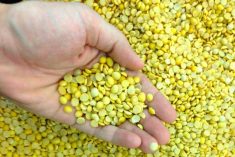Licences for Prairie grain and pulse handler W.A. Grain and Pulse Solutions and its primary elevators in Alberta and Saskatchewan have been suspended by the Canadian Grain Commission (CGC).
The suspensions took effect at 12:01 p.m. Tuesday, a CGC official said in an interview.
“This means for a limited period of time (until April 30) activities (by W.A. Grain) that would require a licence are suspended, which include in principle purchasing grain from western Canadian producers and trading in grain in reference to CGC grades,” Remi Gosselin, the CGC’s head of communications said.
Read Also

Senft to step down as CEO of Seeds Canada
Barry Senft, the founding CEO of the five-year-old Seeds Canada organization is stepping down as of January 2026.
Gosselin declined to comment specifically on what prompted the CGC to suspend the Innisfail, Alta.-based company’s licences.
“I can’t get into that, only to say at this point we want to give them a chance to manage their finances and they have nine days to do so,” Gosselin said. “April 30 we will decide if their licences are reinstated or revoked.”
The CGC could also opt to extend the suspensions or reinstate the licences with conditions, he said.
“There is justifiable cause for us to take the actions we did,” he said. “We need to have assurance that they will be able to meet their assurances of licensing beyond April 30. I’ll just leave it at that.”
To be licensed, companies must demonstrate they can pay farmers for the grain they are taking delivery of, and must post security to cover those liabilities.
If the CGC revokes W.A. Grain’s licences, farmers owed money by the company will be asked to submit their claims to the CGC to access security posted by the company. It’s also possible they might get some or all their grain back in-kind.
If it comes to that, affected farmers must document their claims with proper receipts.
Claims are also time-limited. CGC payment protection expires 90 days after grain has been delivered, or 30 days after a cheque for the grain has been issued.
The suspensions include W.A. Grain’s grain dealer’s licence, as well as the licences for its primary elevators at Pambrun, Ponteix and Vanguard in southwestern Saskatchewan and at Bashaw and Bowden in central Alberta.
“The (CGC) order prohibits any movement of grain and that means selling stocks in store, accepting producer deliveries as well as contracting new grain sales unless the grain commission is satisfied there is sufficient inventory to cover outstanding elevator receipts,” Gosselin said.
The CGC won’t know how much grain W.A. Grain has in-store until it conducts an audit, he said.
Several pulse crop buyers have recently experienced financial difficulties, prompting the CGC to revoke their licences and pay farmers using companies’ posted security.
The CGC suspended the licences of Canpulse Foods and Global Grain Canada and their parent company Globeways Canada last Oct. 31, when they were unable to provide security to cover farm liabilities.
All the farmers eligible for compensation were covered, the CGC announced March 2.
The CGC received 40 eligible claims involving Canpulse, totalling more than $3 million. There were 13 eligible claims for farmers dealing with Global Grain, worth nearly $700,000.
Global Grain’s liability was reduced because a number affected farmers were able to get their grain back, Gosselin said.
Two hundred and twenty-two farmers deemed eligible were paid a record $11.1 million through the CGC’s producer protection program in 2020 after ILTA Grain, which specialized in pulse crops, went out of business in 2019.
Another 49 farmers, however, didn’t qualify because of the time limits and collectively lost $1.5 million.
That’s why the CGC urges farmers to get paid as soon as they deliver.
While the CGC monitors licensed grain companies monthly, sometimes buyers can get quickly overextended.
Industry observers say pulse crop buyers are generally more at risk of financial problems for a combination of reasons.
Most are small companies with limited resources.
There are no pulse futures markets, so purchases and sales can’t be hedged, and pulse crop prices can often be more volatile.
Right now it’s also harder to access the shipping containers used to export pulse crops.
— Allan Dawson reports for the Manitoba Co-operator from Miami, Man.















